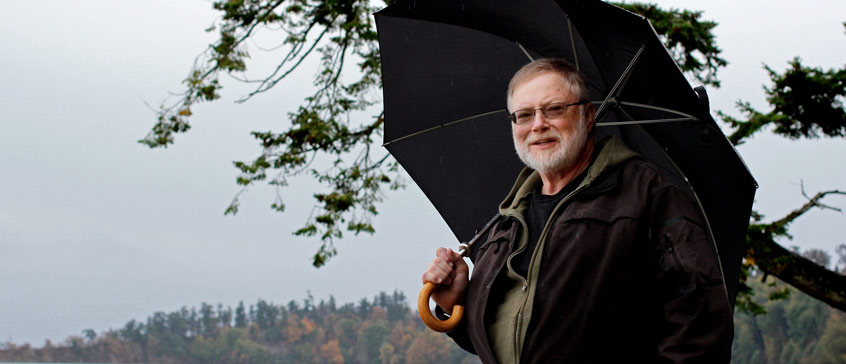Home / Continuing Studies News / Effecting change by murdering assumptions
Effecting change by murdering assumptions

with instructor Nigel Atkin
By Therese Eley, Marketing Services
What do you get when you mix a journalist with a track athlete, a forest-firefighter from the Yukon, a government civil servant, a philanthropist, a writer and a teacher together? Just a few lines of this man’s CV.
To spend an hour with Nigel Atkin, instructor of the Evolution of Public Relations course in our Public Relations Diploma Program, is reminiscent of watching the movie, “Forrest Gump.” Like Gump, Nigel seems to have been present at and witness to so many of modern history’s major events.
Born in the UK in the early aftermath of WW2, his family emigrated, first to Canada and then on to Ohio, where he spent what was an impressible time of his youth.
In the late 1960s, he was steeplechase runner at Ohio University where many of his competitors were training to qualify for the 1972 Munich Olympics. The four years he was at university was a time of massive social change – the Civil Rights Movement, Anti-Vietnam War activities were in full swing. For a student studying journalism, times were rich when direct action dominated the social scene and the news covered riots and civil disobedience that broke out across the country, sometimes culminating in campus violence such as at Kent State and Jackson State.
As a young man, Nigel returned to Canada to work as a forest fire fighter in the Yukon before heading off to the UK to reconnect with family and after a brief stint working in Northern Ireland covering the increasingly violent offensives of the Irish Republican Army, he accepted a position with an international public relations firm in Fleet Street, London, and was sent on a diplomatic mission to the independent Middle Eastern state of Qatar.
From there, Nigel returned to the wilds of the Yukon to work for the Whitehorse Star and then in information and tourism for the Yukon government. His Yukon experiences firmly established a deep respect for First Nations people, their traditions and values.
Ready to settle down, for a time at least, Nigel accepted a position in communications for the Ontario government, serving with four different ministries throughout his 17-year tenure. During this time, Nigel married and started a family, eventually welcoming three daughters to the fold.
In the early-1990’s, Nigel moved his family to Victoria, where he began his teaching career. He is not only one of our longest-serving teachers, he is a founding member of the team who first developed our PR program.
When asked what he enjoys about teaching, he replied, “I think it’s important to increase the understanding of the times we live in. As we move out of the industrial age into the age of information, the technology changes but human nature stays the same. It’s interesting to test those theories out against the currency of our time.”
Nigel now makes Port Alberni his home base, though he still escapes occasionally to where the action is, having, in recent years, taken strategic communications contract positions in both Afghanistan and Iraq as they worked to reconcile and rebuild in the aftermath of war.
Nigel has a guiding principle in his life: “People don’t know who they are unless they’ve done everything. How can you know who you are unless you’ve experienced many, many different things?”
He goes on to say, “The highest ethical journey we can take is to know ourselves. So that’s one of the reasons that I have put myself in a number of different environments. None of them were, in retrospect, that difficult or unique, but they have taught me who I am––how I am––in different situations. And I’m quite comfortable with what I’ve learned.”
Reflecting on people who think they know who they are, he says, “I’m a different person now than I was a week ago, or five years ago or 10 years ago. We keep changing as individuals. To know who you are means you have to keep learning. So the idea of studying, and teaching, is to get people to know who they are ––through experiences, being able to see things differently.”
“We live in a great wash of politics and distraction. I believe that by studying new disciplines, we can actually help heal our minds, which are quite shocked by the images we live in. So I see [lifelong learning] as a natural antidote to many of the issues we face daily.”
- Posted November 29, 2016
Latest News
- Operations management: where strategy becomes action
- Preserving our collective heritage: an interview with instructor Mary Kay Cunningham
- CRMP Newsletter - July 2024
- National Indigenous History Month and Indigenous Peoples Day
- Bridging degrees and dreams through UVic’s Pathway program
Visit Registration
2nd Floor | Continuing Studies Building University of Victoria Campus 3800 Finnerty Road | Victoria BC | CanadaTel 250-472-4747 | Email uvcsreg@uvic.ca
2024 © Continuing Studies at UVic
Legal Notices |
Sitemap

